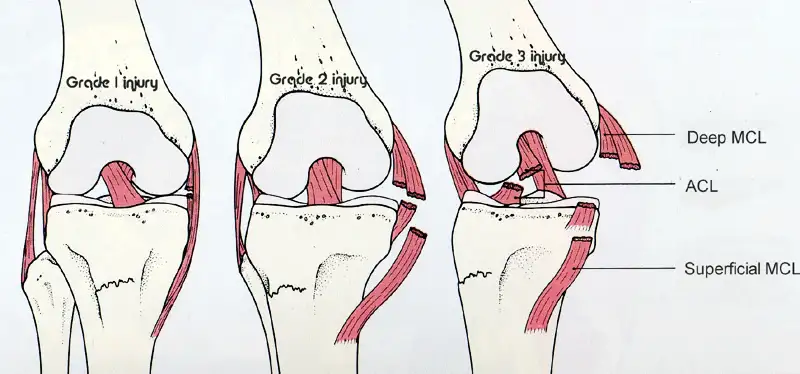Understanding MCL tear symptoms early on is crucial because swift action can make recovery faster and easier. This blog aims to help you identify MCL tear signs and symptoms so you can decide what to do next. Knowing these signs helps in getting the right treatment without delay.
Key Indicators: Recognizing Symptoms and Differentiating from Others
When the MCL is damaged, there are certain symptoms to watch for. Usually, the first sign is a sharp pain on the inner side of your knee. This pain might happen as soon as the injury occurs or become noticeable soon after. MCL tear swelling location is another symptom; you may see or feel swelling on the inner knee part.
Knee instability can also be a symptom of an MCL tear. The knee might feel like it could give way when you put weight on it. This feeling is due to the lack of support because the MCL isn’t working properly anymore.
It’s important to know how MCL tear symptoms differ from other injuries. An ACL injury, often heard about among athletes, usually involves a popping sound and swelling all around the knee, not just on the inner side. On the other hand, meniscus damage usually causes clicking or locking of the knee joint.
Recognizing these differences is critical. Mistaking one injury for another can lead to incorrect treatment. Getting the correct diagnosis ensures the right path to healing.
- Inner knee pain: Sharp and may occur immediately after injury.
- Swelling location: Focused on the inner knee.
- Knee stability: Feeling like the knee could give way.
These symptoms tell a lot about what’s happening inside your knee and help guide how to approach treatment.
Exploring Treatment Options for MCL Tears
Treatment for an MCL tear depends on its severity. For mild tears, rest and ice might be all that’s needed. It’s important to give your knee a break. Avoid activities that could make it worse. Physical therapy is another option. It helps strengthen surrounding muscles to support your knee better.
Moderate tears might need more attention. A brace could be recommended to keep the knee stable. This allows the ligament to heal correctly without further damage. Recovery here usually involves some time with a therapist.
For severe cases, surgery might be required. The procedure is straightforward, aiming to repair the ligament. MCL injury treatment here is about restoring full function. MCL tear recovery time after surgery can vary. Some might take a few weeks, while others a few months depending on the individual and treatment type.
Here’s a brief overview of treatments:
- Rest and ice: For mild tears, minimizes swelling and supports healing.
- Physical therapy: Helps strengthen knee-supporting muscles.
- Bracing: Keeps the knee stable for moderate tears.
- Surgery: Required for severe tears to repair the ligament.
Starting treatment early helps prevent further complications. This ensures that recovery, whether through therapy or surgery, proceeds smoothly and efficiently.
Preventing MCL Tears and Preparing for Medical Consultation
Preventing an MCL tear, especially if you’re active, is possible with some precautions. Warming up before activities helps prepare your muscles. Simple exercises, like leg lifts and squats, can help strengthen your knee area.
If you suspect a tear, taking immediate steps is crucial. Try to rest your knee immediately. Applying ice can help reduce swelling. You might want to consider elevating your leg to lower any swelling further.
Being prepared for a doctor’s appointment will help you get the best advice. Take note of how long you have had symptoms and what activities make them worse. Here’s a quick checklist for your visit:
- Record your symptoms: What have you been experiencing?
- Duration: How long have you had these symptoms?
- Activities: What makes them worse or better?
Preventive measures and knowing what to do if a tear happens makes dealing with potential issues easier. Seeking professional advice sooner rather than later can make a significant difference.
MCL tear causes vary, but often include sudden knee twist or impact. Staying informed helps in prevention, ensuring you are better prepared and less likely to suffer from an MCL tear.
